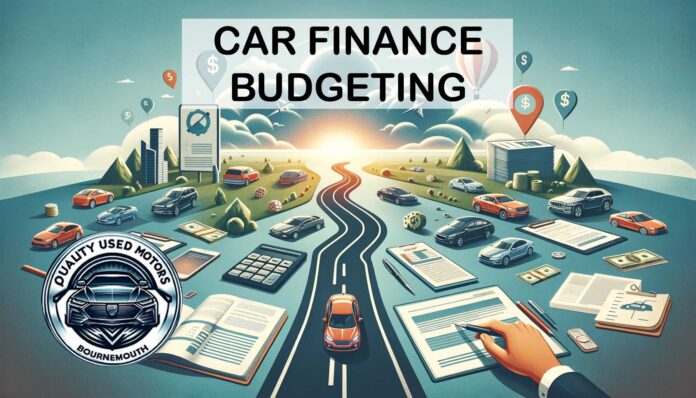Purchasing a used car on finance is a practical choice for many in the UK, offering a way to spread the cost of a vehicle over time. However, navigating car finance requires careful planning, knowledge, and awareness of potential pitfalls. This article aims to provide an authoritative and insightful guide for those considering this option.
Setting Your Monthly Budget
Choosing the right finance for a used car necessitates a deep dive into one’s financial health, focusing on creating a realistic and sustainable monthly budget. This refined approach involves more than just adhering to the recommended 15-20% of your net monthly income for car payments. It requires a comprehensive assessment of your financial landscape, considering both fixed and variable expenses to ensure financial stability.
Advanced Budgeting Techniques
Zero-Based Budgeting: Start by allocating every pound of your income to specific expenses, savings, and debt payments until you have zero pounds unaccounted for. This method forces you to justify every expense, including your car payment, ensuring it fits within your financial means.
50/30/20 Rule: Allocate 50% of your income to necessities, including your car payment, 30% to wants, and 20% to savings and debt repayment. This can help you balance between the car you need and the car you want, based on financial priorities.
Incorporating Running Costs
When setting your budget, consider all running costs associated with owning a car, not just the finance payment:
Fuel Efficiency: Look into the average miles per gallon (MPG) of the car models you’re considering. Fuel costs can vary significantly between different types of vehicles.
Insurance Premiums: Insurance costs can vary based on vehicle type, location, driving history, and even credit score in some regions. Obtaining insurance quotes before finalising your car purchase can prevent unexpected expenses.
Maintenance and Repairs: Factor in the cost of regular maintenance as well as potential repairs. Used cars might require more upkeep, so setting aside a monthly or annual budget for maintenance can prevent financial strain.
Annual Taxes and MOT: Remember to include the cost of vehicle excise duty and the annual MOT test (for cars over three years old) in your budget.
Considering Depreciation
Depreciation is the silent budget killer that many overlook. The rate at which a car loses its value affects not just the overall cost-effectiveness of your finance agreement but also impacts your financial assets and net worth.
Research Depreciation Rates: Different models depreciate at different rates. Opting for a car known for holding its value can be a more financially sound decision in the long run.
Consider Future Sale Value: Think about the resale value of the car towards the end of your finance term. If you plan to sell the car, choosing one with a slower depreciation rate will benefit you financially.
Tips for Financial Flexibility
Emergency Fund: Ensure you have an emergency fund that can cover at least three to six months of living expenses, including car payments. This fund acts as a financial buffer in case of unexpected events.
Flexible Finance Options: Look for finance agreements that offer flexibility, such as the ability to make overpayments without penalties or the option to defer payments in case of financial difficulties.
Deciding on the Finance Percentage
Determining the right finance percentage is indeed a pivotal element in the car financing process. This decision not only influences your immediate financial outlay but also your long-term financial health. Let’s delve deeper into optimising your finance percentage with additional insights and strategic considerations.
Strategic Down Payment Planning
Opting for a larger down payment to finance a smaller portion of the car’s value can indeed be beneficial, yet it demands a nuanced approach. Consider these additional factors:
Opportunity Cost: Evaluate the opportunity cost of using your savings for a down payment. Could this money yield a higher return if invested elsewhere? Comparing the interest rate on the finance with potential investment returns can inform your decision.
Emergency Fund Impact: Ensure that your down payment does not deplete your emergency fund. Financial experts often recommend maintaining an emergency fund of 3-6 months’ worth of living expenses. Ensure your down payment leaves this safety net intact.
Leveraging Finance Offers
Special Finance Deals: Sometimes, dealerships offer special financing deals with lower interest rates or even 0% APR for a portion of the loan term. If such offers are available and you qualify, financing a larger percentage could be more advantageous, preserving your cash for other uses.
Fine-Tuning Your Finance Percentage
Balanced Approach: Finding a middle ground can be key. A moderate down payment that doesn’t deplete your savings while avoiding excessive financing can offer a balanced approach. This can help maintain your financial flexibility without incurring unnecessary finance costs.
Avoiding Negative Equity
GAP Insurance: If you finance a large percentage of the car’s value, consider GAP (Guaranteed Asset Protection) insurance. This insurance covers the difference between the car’s market value and the outstanding loan amount if the car is totalled or stolen, protecting you from negative equity.
The Role of Credit Score
Interest Rate Impact: Your credit score significantly impacts the interest rate you’re offered. A higher credit score can secure lower interest rates, potentially making financing a larger portion of the purchase price more palatable. Regularly reviewing and improving your credit score can open up more favourable finance options.
Future Financial Planning
Long-Term Budgeting: When deciding on the finance percentage, project your long-term budget to account for changes in income, potential large expenses, and financial goals. This foresight can prevent overcommitting on a car loan that becomes unsustainable.
Tailoring to Your Financial Ecosystem
Comprehensive Financial Assessment: Consider your entire financial ecosystem, including current debts, savings goals, investment strategies, and income stability. Your finance percentage should align with your broader financial landscape, ensuring that your car purchase enhances rather than hinders your overall financial well-being.
Navigating Potential Pitfalls
Exceeding Mileage Limits in PCP:
Proactive Planning: Estimate your mileage generously to avoid penalties. If your driving habits change, contact your finance company to discuss adjusting your mileage allowance, which may increase your monthly payments but can prevent hefty fees later.
Wear and Tear Charges:
Regular Maintenance: Keep the vehicle in good condition, adhering to the manufacturer’s servicing schedule. Document all maintenance and repairs to avoid disputes at the end of the agreement.
Interest Rates:
Comparative Shopping: Use comparison websites and finance calculators to explore various finance options. Understanding the APR and total cost of credit across different products can help you find the most economical choice.
Depreciation:
Informed Selection: Choose a car with a strong residual value to mitigate the impact of depreciation. Cars that hold their value well are less likely to leave you in negative equity at the end of a finance term.
Steering Towards Financial Success with Quality Used Motors
Beyond Monthly Payments: Ensuring Financial Agility
Effective financial management of your car finances extends beyond the simplicity of making timely payments. For patrons of Quality Used Motors in Bournemouth, a reputable used car dealer known for its commitment to customer satisfaction, it’s vital to revisit your finance agreement regularly. This practice becomes especially critical when you encounter shifts in your financial landscape.
Should you face financial headwinds, Quality Used Motors encourages a proactive dialogue with your finance provider to uncover potential resolutions. This forward-thinking approach helps maintain your financial stability and protects your credit standing.
Leveraging Refinancing: A Path to Optimised Terms
Refinancing stands out as a strategic opportunity, particularly appealing if there’s been a dip in market interest rates or an improvement in your credit score since the inception of your original agreement. This route, often facilitated by financial advisors, can lead to more favourable monthly payments or a reduction in the loan term, crafting a more manageable financial commitment for you.
Crafting a Strategic Path Forward with Quality Used Motors
At Quality Used Motors in Bournemouth, we understand that finding the right car finance solution is key to achieving your automotive goals without compromising your financial health. We collaborate with leading car finance companies to offer a range of options tailored to meet the diverse needs of our customers. This partnership allows us to provide flexible financing solutions that cater to a variety of financial situations, ensuring that you find a deal that suits not just your budget but also your lifestyle.
Our approach is grounded in the belief that there’s more to choosing a finance plan than simply opting for the lowest monthly payment. We encourage our customers to consider the total cost of car ownership, which includes not only the finance charges but also factors like insurance, maintenance, fuel costs, and depreciation. This holistic perspective ensures that the car you choose fits seamlessly into your broader financial picture and lifestyle objectives.








